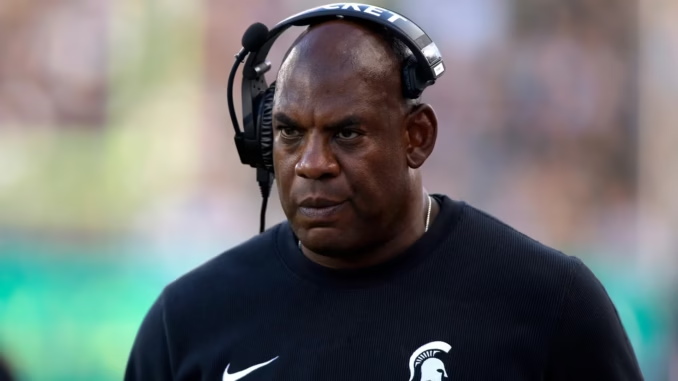
The Mel Tucker era continues to linger over Michigan State football. Following his departure in the 2023 season due to an off-field controversy with Brenda Tracy, the Spartans aimed for a fresh start. Athletic Director Alan Haller swiftly began the hunt for a new head coach, while interim coach Harlon Barnett guided the team to a 4-8 record, marking their second consecutive year without a bowl game.
Tucker’s tenure was initially defined by highlights like Kenneth Walker III’s standout performance and a Sugar Bowl appearance, alongside setbacks such as recruiting struggles and the Tracy scandal. Now, a new layer has emerged: Michigan State faces an NCAA investigation into alleged violations from Tucker’s time as coach, ensuring his legacy remains a topic of discussion.
The specific details of the violations Michigan State football is being investigated for by the NCAA during Mel Tucker’s tenure remain unclear, as the university and NCAA have not publicly disclosed them. Reports suggest they are related to recruiting, and it appears Michigan State self-reported the issues, which could potentially lessen any penalties. Self-reporting often demonstrates a willingness to cooperate and address problems, a factor the NCAA might consider favorably when determining sanctions.
Given the lack of specifics, it’s reasonable to speculate that these could be minor infractions—perhaps improper contact with recruits or procedural missteps—rather than major violations like payments or academic fraud, especially since Tucker’s overall record (20-14, with only one standout 11-2 season in 2021) doesn’t suggest a program reaping significant competitive advantages. The Spartans struggled in 2020 (2-5), 2022 (5-7), and 2023 (4-8, with Tucker fired midseason), indicating that whatever occurred didn’t translate into sustained success.
Michigan State has emphasized its full cooperation with the NCAA, a stance that aligns with your observation. This collaboration, combined with the fact that the violations occurred under a previous staff, might limit the severity of punishment—potentially probation or a small reduction in scholarships rather than harsher measures like postseason bans. The university’s leadership, including President Kevin Guskiewicz, is arguing that the current program under second-year coach Jonathan Smith should not bear the brunt of past issues, further supporting the hope that any impact on the 2025 season and beyond will be minimal.
Still, some form of penalty seems likely, as the NCAA rarely concludes investigations without consequences, even for self-reported cases. The best-case scenario might mirror outcomes for similar minor violations: a year of probation and a few lost scholarships. For now, without concrete details, it’s a waiting game—but the lack of apparent benefit during Tucker’s era and the university’s proactive approach could keep the fallout manageable.
Leave a Reply